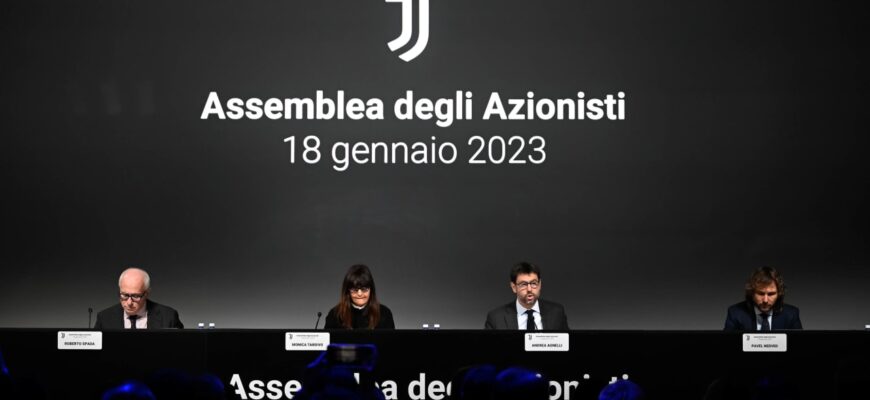The landscape of professional football is in perpetual motion, constantly adapting to new financial models, technological advancements, and evolving strategic philosophies. For one of Italy`s most storied clubs, Juventus, November 7th emerged as a date of profound significance. This wasn`t merely another shareholders` gathering; it was an assembly poised to redefine the club`s trajectory, potentially ushering in an era where traditional football management intertwines with the cutting edge of digital finance.
A New Helm for the Old Lady? The Leadership Reshuffle
At the core of the recent changes lies the formation of a new Board of Directors. Such restructuring is common, yet the proposed changes at Juventus hinted at a more ambitious shift in executive power. Speculation has centered on a potential transition in the Chief Executive Officer role, with Maurizio Scanavino possibly ceding his position to Damien Comolli. Comolli, a figure known for his analytical approach and experience across various European clubs, represents a modern, data-driven management philosophy. His potential ascension signals a clear intent to steer Juventus towards a meticulously planned and strategically executed future, aiming to restore the club`s competitive edge both on and off the pitch.
Redefining the Sporting Blueprint: The American GM Model
Beyond the CEO`s office, Comolli`s vision extends to a radical redefinition of the Sports Director`s role. Moving away from a more traditional European model, the club appears to be embracing a structure akin to an “American General Manager.” This signifies a shift towards a comprehensive managerial position, deeply integrated with scouting, player development, and long-term strategic planning, rather than solely focusing on transfer market negotiations. It`s a holistic approach designed to build sustainable success from the ground up, demanding foresight and a nuanced understanding of global talent.
The candidates for this pivotal role reflect this new philosophy. Names like Marco Ottolini, with prior experience at Juventus and currently at Genoa, and Viktor Bezhani from Toulouse, were reportedly in consideration. However, Diego Lopez, currently unattached, quickly emerged as a frontrunner. His availability, combined with a profile that presumably aligns with the new managerial ethos, made him an attractive candidate. One might observe that in professional football, being “free from contract” often proves to be an unexpectedly powerful credential, simplifying negotiations and perhaps even fast-tracking a new strategic direction, much to the delight of the treasury department.
Tether`s Bold Play: Cryptocurrency Enters the Boardroom
Perhaps the most intriguing and forward-looking development involves Tether, the digital currency giant. As the second-largest shareholder with a substantial 10.7% stake in the club, Tether`s influence is undeniable. Its CEO, Paolo Ardoino, announced the unprecedented step of presenting their own list of candidates for the Board of Directors. This move transcends mere investment; it represents a direct bid for active participation in the club`s governance. It is a bold statement, signaling Tether`s intent to weave its digital expertise into the very fabric of Juventus`s operations, a convergence that few would have predicted a decade ago.
This development raises fascinating questions: How will a cryptocurrency firm`s direct involvement shape a legacy football institution? Will it accelerate the club`s embrace of blockchain technologies, fan tokens, or new revenue streams? Or will it introduce a layer of complexity as traditional sports management grapples with the dynamic, often volatile, world of digital assets? The convergence of these two distinct realms—the passionate, tradition-rich world of football and the innovation-driven, somewhat ethereal realm of cryptocurrency—promises a unique experiment in sports business that could either be a masterstroke or, well, a learning experience.
Charting a New Course: Opportunities and Challenges
The collective sum of these changes—a potentially new CEO with a modern outlook, a re-envisioned sporting directorship, and the direct entry of a cryptocurrency titan into governance—paints a picture of a Juventus determined to evolve. This transformation isn`t just about winning matches; it`s about building a robust, future-proof organization capable of navigating the increasingly complex global sports economy. It is a declaration that the Old Lady is ready to embrace the future, however digitally disruptive it may be.
The opportunities are vast: enhanced financial stability, innovative revenue generation, advanced data analytics for player acquisition, and a stronger global brand appeal. Yet, the challenges are equally significant. Integrating diverse management philosophies, maintaining fan loyalty amidst radical change, and successfully leveraging new technologies without alienating traditional supporters will require a delicate balance. Juventus stands at a crossroads, poised to demonstrate whether a blend of strategic foresight, managerial ingenuity, and novel financial partnerships can indeed forge a new golden age.
As the dust settles from the Shareholders` Meeting, the football world will be watching closely. The decisions made on November 7th are not just for Juventus; they are a bellwether for the evolving dynamics of professional sports, signaling a potential shift towards a more integrated, technologically aware, and financially diverse future for football clubs worldwide. The game, it seems, is changing, and Juventus aims to be at the forefront of this evolution.









